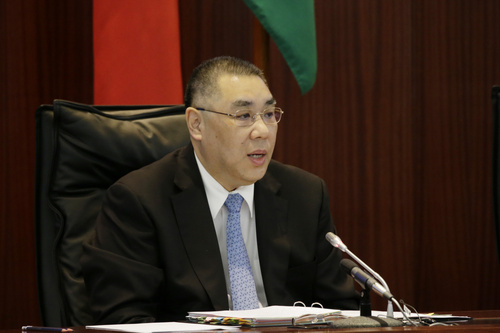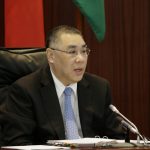 The Chief Executive, Mr Chui Sai On, attends a plenary session at the Legislative Assembly to answer questions raised by Assembly members concerning Government policy and social issues.
The Chief Executive, Mr Chui Sai On, attends a plenary session at the Legislative Assembly to answer questions raised by Assembly members concerning Government policy and social issues.
The Government is paying great attention to the public’s opinions regarding Macao’s Land Law, but the authorities do not have a timeline for amending it, said the Chief Executive, Mr Chui Sai On, on Thursday.
Speaking during the question-and-answer session at the Legislative Assembly, he stressed the Government had been strictly adhering to the Land Law as it currently stands. The statute in its current form was last amended and passed by the Legislative Assembly in 2013. That version became effective in 2014.
Every land concession under the Land Law was for a 25-year period; that condition had applied before the 2013 amendment process, and had not been changed at that time. Should any interested parties consider that the Government had acted wrongfully in handling land issues, they could seek redress via the local courts.
The Basic Law and the Land Law were the fundamental means by which the Government could manage land resources within the boundaries of the Macao Special Administrative Region. Closely monitoring and reasonably allocating land resources were Government responsibilities, said the Chief Executive.
In other comments, Mr Chui said the Government was confident about, and committed to, addressing Macao’s housing issues according to the Government’s overall housing policy objective of “Homes for all in a contented society". Housing planning would not be affected by the change of administration next year, Mr Chui believed, referring to the anticipated continuity of policy under his eventual successor in the chief executive role.
The Government had so far not issued any land concession relating to any of the five plots of land reclaimed from the sea and earmarked for urban development. The five reclaimed areas would be used for, respectively, Government facilities, public and social services, public housing units, and other infrastructure. According to current planning, reclamation Area A would have 28,000 public housing units, while two plots in Area A were planned for use by social services, including the establishment of four centres for the elderly.
The Government had been analysing the notion of creating new types of public housing category, Mr Chui added.
Regarding plans for the now-closed dog racetrack known as the Canidrome, on Macao peninsula, the Government pledged the site would not be developed for housing, hotel accommodation or gaming facilities. The site would in future serve as a land reserve for betterment of the public’s lives, namely for education, sports, social services and public facilities.
The Government had also mulled the possibility of building underground facilities at the site – such as water tanks – for improved management of public emergencies, he added.
The Government’s proposal for the use of the Canidrome site had been formulated and would be sent for consideration by the Urban Planning Committee.
In addition, the Chief Executive also outlined to Assembly members the Government’s preliminary proposal for the overall management of storage facilities for hazardous materials. The preliminary proposal included: 1) relocation of the existing hazardous waste storage facilities in Ilha Verde to the portion of the boundary crossing area – that is administered by Macao – in the artificial island between Zhuhai-Macao on the Hong Kong-Zhuhai-Macao Bridge; 2) pressing ahead with a plan to build temporary storage facilities in Rua Marginal da Concórdia in Coloane; and 3) reserving part of the western end of reclamation Area E1 to create facilities for dealing with such materials.
The Government paid close attention to the opinions of the public on this matter, said Mr Chui. The Government would provide the public with more details regarding: the criteria for selecting the proposed location in Coloane for the temporary storage facilities for hazardous materials; the Government’s effort in the management of hazardous goods; the planned emergency response measures in case of accident; and the plan to build near the proposed Coloane storage venue, a fire station with emergency services personnel that would monitor the situation.
During Thursday’s question-and-answer session, the Chief Executive explained Government policies and positions on social issues. A total of 30 Assembly members had prepared questions on a number of topics. The topics included: the under-construction Light Rapid Transit system; development of Macao’s gaming industry; services for the elderly; use of public funds; Macao’s economic prospects; the city’s sport industry; tourism training; smart city development and protection of personal data.


